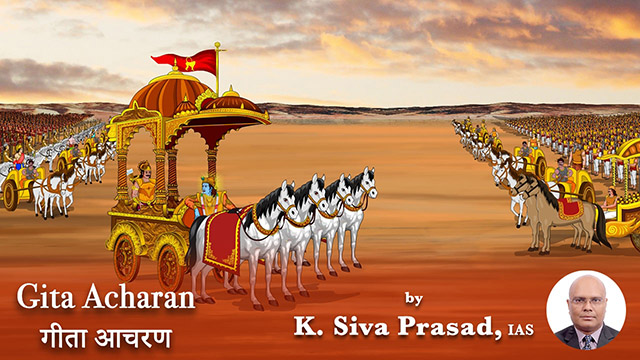
Krishna mentioned ' 𝙊𝙢 𝙏𝙖𝙩 𝙎𝙖𝙩' as a threefold representation of the Supreme Absolute Truth - Brahma . He explains ' 𝙎𝙖𝙩 ' and says, "The word ' 𝙎𝙖𝙩 ' means eternal reality and goodness. O Arjun, it is also used to describe an auspicious action. Being established in the performance of 𝙮𝙖𝙜𝙣𝙖 (sacrifice), 𝙩𝙖𝙥𝙖𝙝 (penance), and 𝙙𝙖𝙖𝙣 (charity) is also described as 𝙎𝙖𝙩. And so, any act for such purposes is named 𝙎𝙖𝙩 (17.26-27). Whatever is done or practiced like 𝙮𝙖𝙜𝙣𝙖, 𝙙𝙖𝙖𝙣 or 𝙩𝙖𝙥𝙖𝙝 , when done without 𝙨𝙝𝙧𝙖𝙙𝙙𝙝𝙖 is termed as ' 𝙖𝙨𝙖𝙩 '. It is not for here or hereafter" (17.28).
Krishna described 𝙨𝙖𝙩 and 𝙖𝙨𝙖𝙩 at the beginning of the Bhagavad Gita. He said 𝙨𝙖𝙩 (reality) never ceases to be while 𝙖𝙨𝙖𝙩 (unreal) has no existence and only a 𝙜𝙮𝙖𝙣𝙞 can distinguish between them (2.16).
Firstly, 𝙖𝙨𝙖𝙩 is that ‘which didn’t exist in the past and wouldn’t be there in the future’. If we take the example of sensual pleasures, feelings or physical entities, they weren't there before and wouldn’t be there after some time. Secondly, the rope-snake analogy is used to explain that 𝙖𝙨𝙖𝙩 derives its existence from 𝙨𝙖𝙩 , just as the snake doesn’t exist without the rope.
Krishna gives another path here when he says that whatever is done or practiced like 𝙮𝙖𝙜𝙣𝙖, 𝙙𝙖𝙖𝙣 or 𝙩𝙖𝙥𝙖𝙝 , when done without shraddha is termed as ' 𝙖𝙨𝙖𝙩 '. Shraddha is the essential ingredient to perform ' 𝙨𝙖𝙩 ' karmas . This path opens up another interpretation.
𝙎𝙝𝙧𝙖𝙙𝙙𝙝𝙖 is unflinching devotion where any outcome of an action is taken as the blessings of 𝙋𝙖𝙧𝙖𝙢𝙖𝙩𝙢𝙖 . In other words, it is performing 𝙠𝙖𝙧𝙢𝙖 without expecting 𝙠𝙖𝙧𝙢𝙖𝙥𝙝𝙖𝙡 (fruits of action) (2.47). This is also achieved by dropping the sense of doer-ship (𝙠𝙖𝙧𝙩𝙖𝙥𝙖𝙣) for any 𝙠𝙖𝙧𝙢𝙖 we perform. Any 𝙠𝙖𝙧𝙢𝙖 becomes auspicious when both a sense of doer-ship and the desire for 𝙠𝙖𝙧𝙢𝙖𝙥𝙝𝙖𝙡 is dropped and hence, Krishna calls it performing auspicious 𝙠𝙖𝙧𝙢𝙖𝙨 .
https://epaper.dailyworld.in/Details.aspx?id=142656&boxid=78371&uid=&dat=2024-08-11

